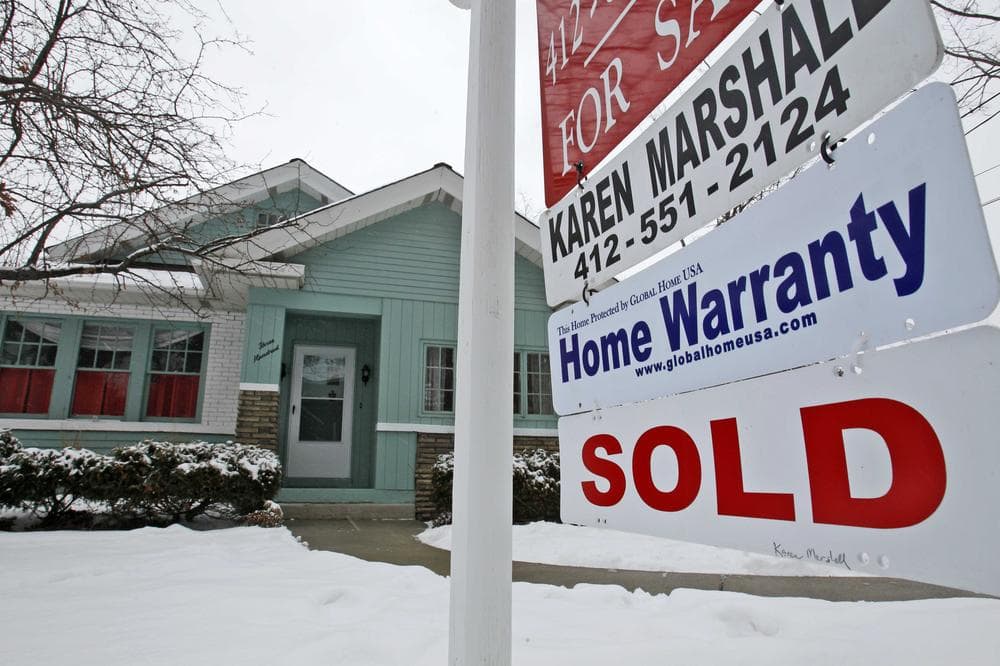Advertisement
Act Now! Mortgage Offers Promise Deals That Are Too Good To Be True
Resume
Here & Now Guest:
AnnaMaria Andriotis of SmartMoney.com talked to Here & Now's Robin Young about new, hard-to-believe deals being offered by the mortgage industry.
Are your mailboxes, both virtual and brick and mortar, stuffed with mortgage lender offers?
Banks and mortgage brokers are making promises like: Fixed rates as low as 3.75 percent. Appraisal may not be required. No closing costs. No income verification.
These are the same sorts of deals that helped create the housing boom and financial bust during the past decade. But now, with mortgage rates starting to creep up, lenders are once again becoming more aggressive.
"There have been more of these offers that have been circulating out there," AnnaMaria Andriotis of SmartMoney.com told Here & Now. "What consumers need to keep in mind is, there's going to be a catch."
A recent marketing letter from Anchor Financial Mortgage Incorporated of Pawtucket, R.I., offered consumers fixed rates as low as 3.75 percent.
Currently, the average rate on a fixed, 15-year mortgage is 4.95 percent and on a fixed, 30-year mortgage, the rate is 5.3 percent. According to Andriotis, even those rates only go to consumers who put 20 percent down and have credit ratings of 720 (our of 850 points).
When reached by phone, Dominic Polis of Anchor Financial told Here & Now, that despite the marketing letter, most of the loans they offer have higher rates, closer to 4.125 or 4.25 percent.
Andriotis said she's not surprised.
"Most pitches are advertising the lowest rating a company can offer and in some cases, those rates are not even possible," she said.
Adjustable Rate Mortgages
There are some legitimate offers of rates below four percent, but they are coming in the form of adjustable rate mortgages or ARMs. Under these deals, consumers lock in a fixed rate for a certain period of time, but then the interest rate changes month by month.
For example, a "5-1 ARM" offers consumers rates as low as 3.8 percent for the first five years, then the rate changes month by month, so the borrower will have no idea how much their mortgage payment will be, or whether they'd be able to afford it.
"You could be looking at a sad case of not being able to make that mortgage payment and facing foreclosure," Andriotis said.
She said the only time an adjustable rate mortgage makes sense is if a homeowner plans to sell their property before the fixed-rate period is up.
Appraisal May Not Be Required
Anchor Financial, like many lenders, advertised that a home appraisal may not be required. Posil said that under certain conditions, that's true.
"If you have an existing FHA (Federal Housing Administration) mortgage, FHA allows any lender or broker to do an FHA streamlined mortgage without an appraisal, if you're doing it just to lower the rate," Polis said.
Andriotis said that may be the case, but most mortgages require an appraisal done by the lender, since they want to ensure that the home is worth the amount of money they're lending.
A more troubling marketing tactic involves no income verification. During the housing boom of the past decade, lenders would offer loans without confirming how much money a borrower made. Lenders were able to quickly process and approve loans, but ultimately, the borrowers couldn't afford the mortgages and in many cases, were forced into foreclosure.
Downs Financial, Inc. of Denver, Colo., offers no income verification loans on its website. Andriotis said she's not familiar with that company, and they did not return calls inquiring about that offer.
However, in some cases, borrowers who are refinancing, may be able to do so without income verification or a home appraisal.
Hard Money Lenders, a.k.a. Loan Sharks
Andriotis also mentioned "hard money lenders," who offer no income verification loans. But they come with a stiff price.
"Often times, hard money lenders are also known as loan sharks," Andriotis warned.
Hard money lenders will require more money down and offer rates as high as 10 percent. They also require collateral, like a car, which can be seized if the borrower falls behind on their payments.
But even if lenders are offering the cash, it's ultimately up to consumers to take a hard look at their finances before taking out a mortgage.
"Why would you, as a borrower, do this to yourself?" Andriotis questioned. "Just hold off a bit, wait until you have saved up more money, wait until you have that job is more secure, paying more. Otherwise, you could be setting yourself up for what could be a disastrous situation."
Mortgage Shopping Tips
- First check with your local bank, then a respected mortgage broker
- Many credit unions are offering mortgages, and they are often at lower rates than mortgage brokers offer.
- The Certified Mortgage Planning Specialist Institute is one reputable organization that offers certification. Check to see if your mortgage broker has their certification.
- Before entering into an agreement with any mortgage lender, check them out with the Better Business Bureau.
- Check out the Ripoff Report to see if consumers have complained about the lender.
By Kevin Sullivan
This segment aired on March 1, 2011.